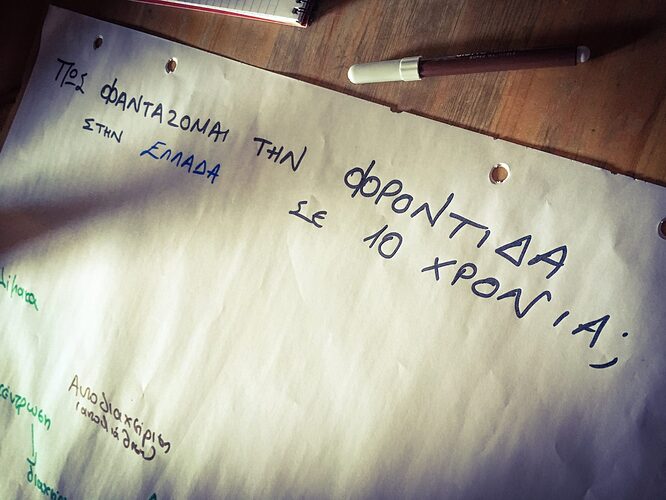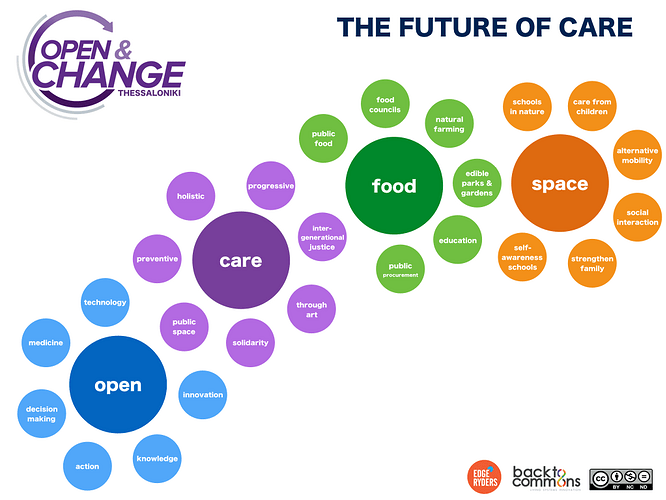We chose Thessaloniki as a good location for our workshop, due to the active social web that is active in the city since the financial crisis hit home in 2009. Being Greece’s second biggest city, and the largest city of the country’s North, Thessaloniki boasts with life, with a vibrant culture that is merging optimally the city’s laid back flair, with its rich history, the university community and contemporary culture. In the last years, Thessaloniki is emerging as a lively incubator of several grassroots initiatives. The first urban gardening projects of Greece happened here, when a group of citizens occupied a former army camp. Social enterprises, consumers networks, activist groups and a significant arts scene are here at home.
The workshop took place on September 3rd, 2016, inviting socially active citizens in the wider field of care. In many cases, these people are not strangers to each other. The city is neither too big, nor too small, and people that care are often meeting each other in the numerous gatherings, events and activities organised at the grassroots.
Τhe workshop offered an open space to meet and discuss, using several tools for harnessing collective intelligence. Using various participatory methodologies, such as World Café, participants mapped out the status quo, how they would imagine Care in Greece in 10 years from now, while engaging into framing this transition.
Mapping the status quo
The current care system of Greece is characterised by mainstream centralised structures defined (and accepted) by the public health system, marked by chronic problems related to inefficiency, corruption and lack of funding. The severity of the ongoing financial crisis in Greece has further incapacitated the public care system, but it has given rise to a milieu of social, citizen-led projects who leverage volunteerism to care for the most under-privileged parts of the society.
Besides public hospitals and private clinics, these structures harbour initiatives ranging from non-profit actions by international and domestic NGOs or philanthropic organisations (including the church), to volunteer initiatives and informal groups. Over the last years, such initiatives have focused on the distribution of primary need goods (ie. clothes, food, education), based on a strong narrative around the solidarity and exchange economy. In parallel with citizen-led initiatives, many city councils have launched municipal Social Grocery stores or Pharmacies. In many cases, local community action is combined with public social structures.
Citizen imagine Care in Greece in 10 years
Citizens were asked to engage into collaborative dialogue on the future of care in Greece, using the World Café method. Participants were divided in two groups and shared ideas on different and multi-level care structures. People from one group swapped with the other, in oder to cross-polinate their knowledge which was later harvested to reveal interesting connnections between different aspects of care.
The new paradigm focuses on synergies at different levels, putting emphasis on notions and ideas that bring people together, build trust, strengthen relationships in communities. From the level of housing, neighbourhoods and schools, all the way to managing structures of public health and social care. Interesting ideas were shared from participants, for example how we can train care stuff in novel and specialised approaches such as “preventive” mourning. Others talk of the need for communal spaces in blocks of flat, where residents can share tools or creative moments, enhancing social interaction in the buildings they live.
For the participants, the future of care innovation is closely connected to openess and the availability of public space. Not surprisingly, many people appreciated the power of urban gardening in offering green spaces, but also in building a sense of community in the neighbourhood.
The transition to such a system is not without obstacles, especially by virtue of the lack of political sense in the crisis-stricken country that is experiencing the deepest recession since World War II. Nevertheless, after 7 years of fighting the crisis, some cells inside the society start having a very clear idea about the pathway forward.
To visualise these change dynamics, participants were asked to engage into Transition Framing, investigating aspects of the care system that should be continued, eliminated, improved or complemented.
The care communities of Greece are the unsung heroes of this crisis. They formed quickly, evolve slowly and are present where both and the public sector fail: providing free, open care to the most sensitive target groups (ie. homeless, elderly, immigrants). Given the financial, political and administrative support they diserve, these communities could transform the game, and offer the hope of recovery to all Greeks, but also Europe as a whole.


